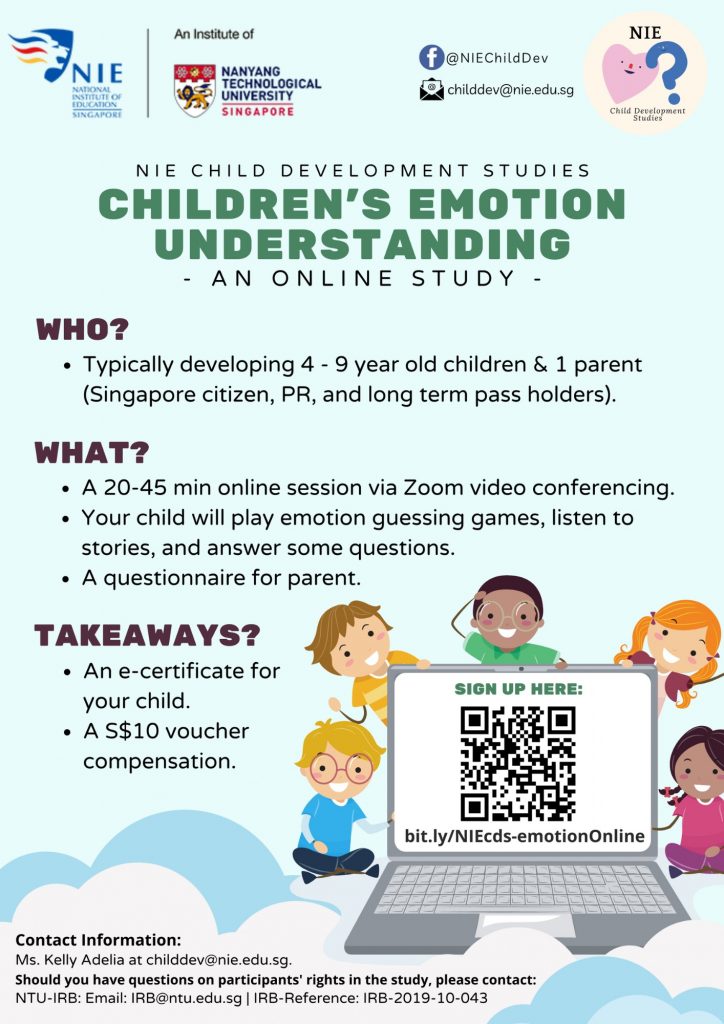Singaporean children’s emotion understanding and its relations to anxiety and academic achievement
Project ID: OER 09/19 YY
Subject area: Social and emotional development, Language and Mathematics
Principal Investigator: Dr Yang Yang
Email: yang.yang@nie.edu.sg
About the project
Understanding one’s own or other’s emotions is a fundamental skill in children’s life. Studies in Western cultures have shown that children’s emotion understanding predicts their prosocial behaviors, social competence, academic achievement, and so forth (Denham, et al., 2003; Izard et al., 2001; Rhoades, Warren, Domitrovich, & Greenberg, 2011). However, little is known regarding the development of Singaporean children’s emotion understanding or its relations to their developmental outcomes.
This project aims to examine Singaporean children’s emotion understanding from different approaches and its relations to anxiety and academic achievement. Understanding these relations could provide avenues for understanding the mechanisms and identifying individuals at risk for socioemotional and school difficulties. People from varied cultural backgrounds differ in their attention to particular aspects of emotional cues. Whereas semantic content explicitly expresses feelings, vocal tone and facial expression convey relatively implicit information regarding emotions. European Americans tend to communicate emotions more directly through verbal content, while Asians’ emotion communication tend to be more indirect and implicit.
European Americans paid more attention to emotional cues from verbal content, whereas Asians were better at understanding emotional cues from contextual information such as vocal tones (Ishii, Reyes, & Kitayama, 2003). Our own prior work indicated that school-aged children had learned to be sensitive to the culturally significant emotional cues. Chinese children recognized emotions from vocal tones more accurately and quickly than American children who performed better on recognizing emotions from verbal content (Yang, Wang, & Wang, under review). Are Singaporean children more sensitive to vocal tones and facial expression than verbal content? On the one hand, Singaporean cultures are influenced by Western cultures. On the other hand, Singaporeans remain their habits and traditions of their original cultures in their daily routine and hold traditional values to a great extent. We will examine their ability to detect emotional cues from both facial expressions and auditory stimuli using two computer tasks. Children’s emotion understanding is a crucial core of social awareness within broader socioemotional competence (Denham et al., 2003).
Particularly, children’s anxiety level is negatively associated with their emotion understanding (Trentacosta & Fine, 2010). Understanding emotions can help children communicate their own feelings and predict others’ feelings and behaviors. Therefore, emotion understanding plays an important role in relationship maintenance and emotion regulation. Poor emotion understanding in social situations may trigger inappropriate responses and in turn may lead to increased social difficulties and anxiety level (Fine, Izard, Mostow, Trentacosta, & Ackerman, 2003). On the other hand, attention bias to negative emotions is positively related to anxiety. Children with anxiety disorders were more sensitive to negative emotional cues (Manassis & Young, 2000). Additionally, emotion understanding predicts children’s academic achievement. Children with greater emotion understanding were rated more prosocial by their teachers and more liked by their peers. Therefore, emotion understanding might facilitate effective learning interactions, thus promoted academic achievement (Rhoades et al., 2011). This study will inform us Singaporean children’s emotion understanding, and whether it’s related to anxiety and academic achievement. It is especially critical to identify the factors affecting child anxiety and academic achievement in Singapore, given the high level of anxiety and the emphasis on academic achievements. The findings of this project would shed light on intervention programs for improving children’s emotional wellbeing and academic achievement in Singapore.
Looking for
|



